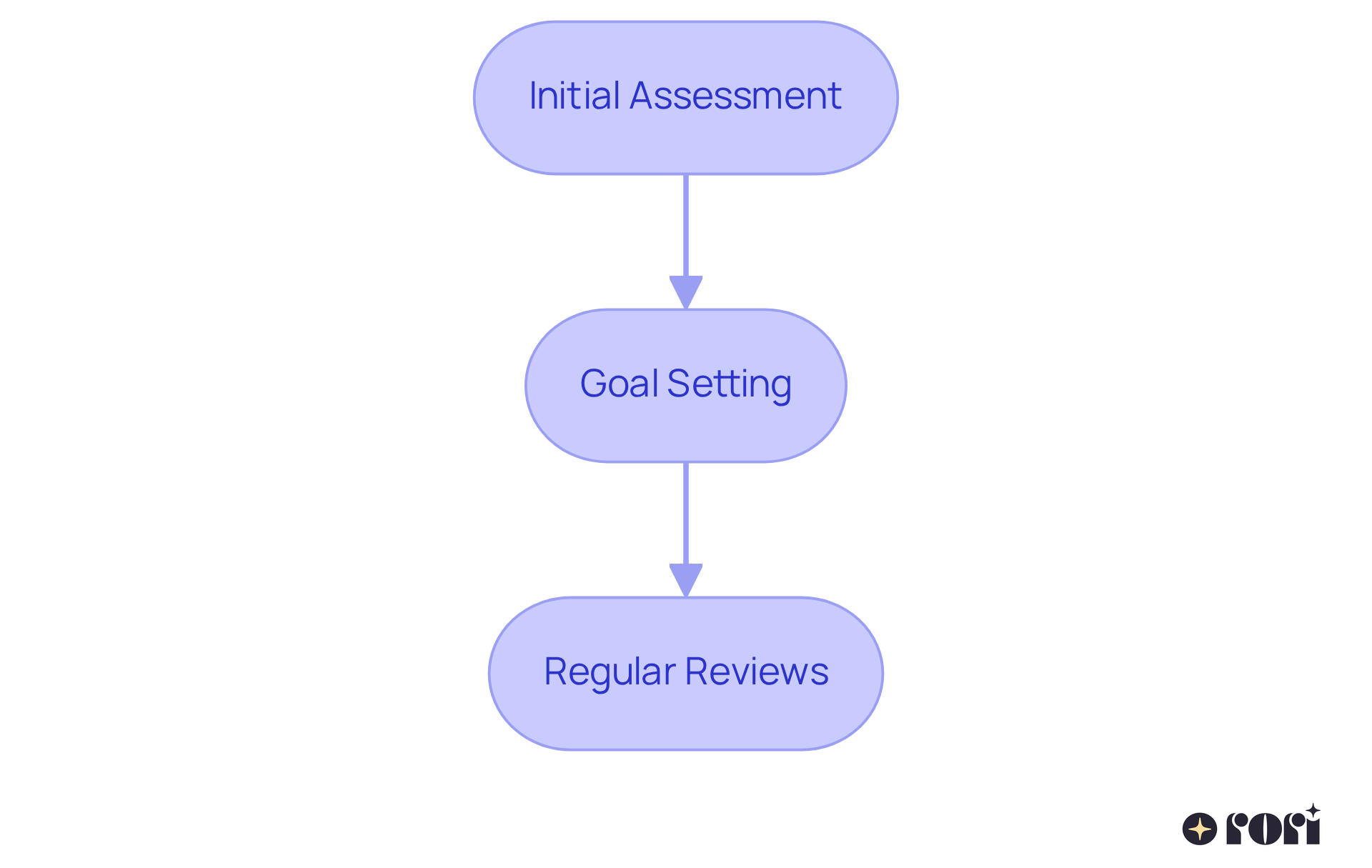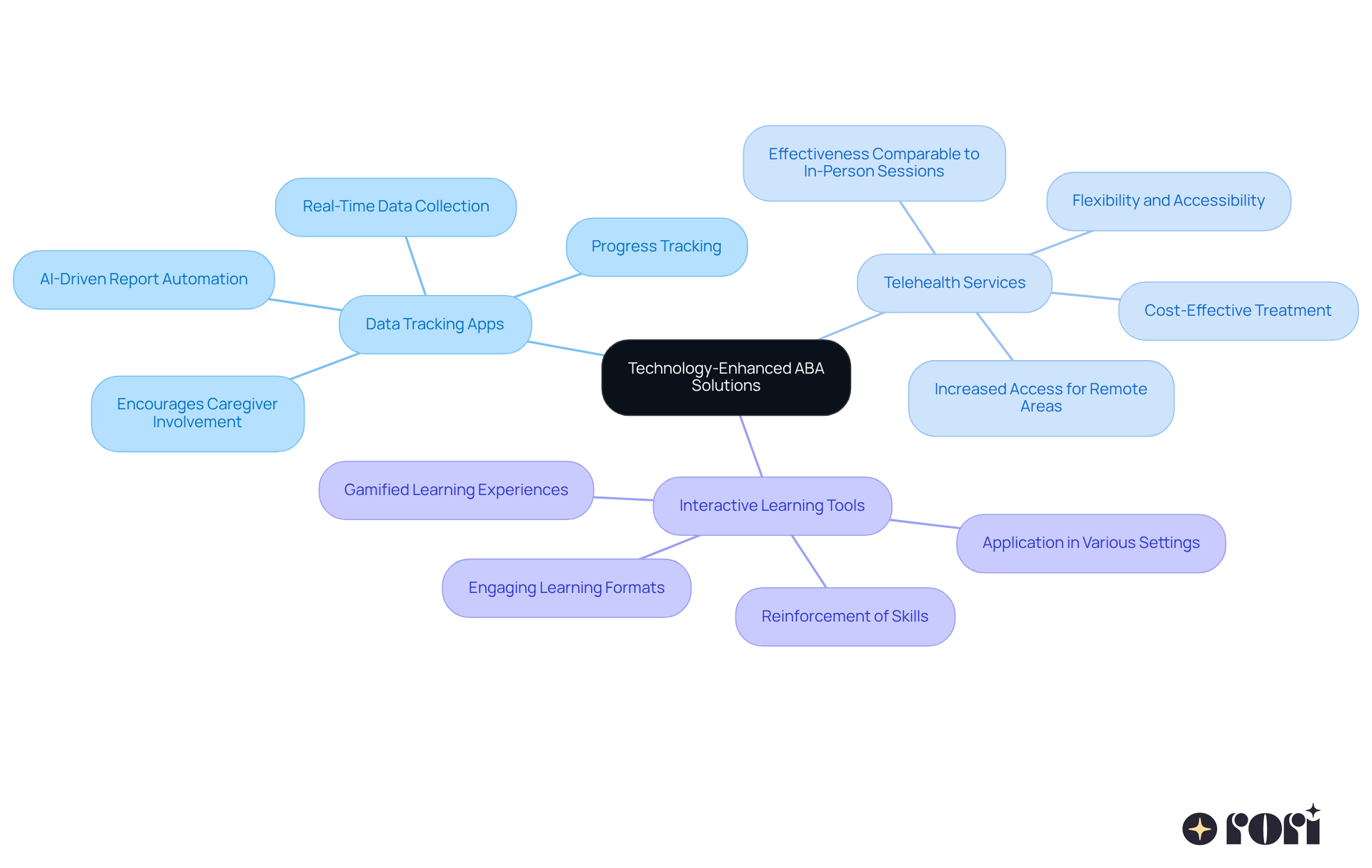Choosing the right ABA clinician for your child can feel overwhelming, can’t it? You want the best for your little one, and understanding the core principles of ABA therapy is a great start. It’s not just about qualifications and experience; it’s also about how personalized the treatment plans are and whether technology can enhance those solutions.
A thorough behavioral assessment is key, along with ongoing data collection and personalized objectives. These elements are critical for effective therapy. And let’s not forget about the clinician’s credentials! It’s important to know that the person guiding your child has the right expertise. Plus, integrating technology can really improve treatment outcomes.
So, let’s explore this together! Finding the right fit for your child is a journey, and you’re not alone in this. We’re here to help you every step of the way!
Finding the right ABA clinician for your child can feel like navigating a tricky maze. It’s a big decision, especially when you think about how much effective therapy can shape developmental outcomes. This guide is here to help you shine a light on the essential steps you can take to find a qualified professional who can tailor interventions to your child’s unique needs.
But with so many options out there, how do you confidently choose the best fit for your family? Let’s explore this together! You’re not alone in this journey, and we’re here to help you every step of the way.
ABA intervention is a scientifically validated method designed to help improve specific behaviors and skills in individuals with autism. With an impressive success rate of over 89%, it uses techniques like reinforcement, prompting, and modeling to encourage positive behaviors while reducing undesired ones. By understanding these foundational elements, parents can see how an ABA clinician can tailor the methods to fit their child's unique needs.
Let’s break it down a bit! Here are some key components:
By getting familiar with these concepts, parents can engage more effectively in discussions with potential clinicians about their child’s treatment needs. This way, you can ensure a collaborative approach to care. Recent studies highlight the importance of behavioral assessment methods employed by an ABA clinician in ABA practices, showcasing their role in achieving significant developmental improvements for individuals with autism. For instance, kids who start ABA therapy before turning two often show remarkable progress in communication and social skills, underscoring the value of early intervention.
Understanding these principles empowers parents to advocate for their child’s best interests throughout the therapeutic journey. So, let’s explore this together! We’re here to help you every step of the way!

Choosing the right ABA clinician for your child can be overwhelming, but it doesn’t have to be! Here are some key qualifications to keep in mind:
Certification: First things first, check if the clinician is a Board Certified Behavior Analyst (BCBA) or has similar credentials. This certification is super important because it shows that they’ve met high standards in behavior analysis, ensuring they know their stuff!
Experience: Next, look for someone with solid experience working with kids who have needs similar to your child’s. Did you know that most ABA therapists have between 5 to 10 years of experience? That’s crucial for effective intervention! Don’t hesitate to ask about their success stories and the specific strategies they’ve used—these insights can really help you gauge their effectiveness.
Continuing Education: It’s also a good idea to find out if the practitioner is committed to ongoing training and education. The field of ABA is always evolving, and staying updated with the latest practices is key to providing the best support.
And don’t forget to ask for references or testimonials from other families! Hearing about others’ experiences can give you a clearer picture of the clinician’s approach and effectiveness. A qualified ABA clinician should be able to explain their methods clearly and show a strong commitment to ethical practices in ABA therapy. After all, you want to ensure your little one gets the best possible support.
Let’s explore this together! If you have any questions or need more guidance, we’re here to help you every step of the way!

Creating a customized care plan is so important for addressing your child's unique strengths, challenges, and preferences. Let’s dive into how you can evaluate the personalization of treatment plans:
Initial Assessment: Before crafting a treatment plan, it’s essential for the clinician to conduct a thorough evaluation to understand your child’s specific needs. This initial assessment lays the groundwork for effective interventions, helping to improve developmental paths by aligning strategies with your family’s unique profile.
Goal Setting: Your care plan should feature specific, measurable objectives tailored to your child’s developmental stage and interests. For example, goals might focus on enhancing communication skills or improving social interactions, ensuring they’re both relevant and achievable.
Regular Reviews: Don’t hesitate to ask about how often the care plan gets evaluated. Effective ABA intervention thrives on flexibility; plans should be revisited every 3 to 6 months to adapt to your child’s changing needs and progress. Gathering ongoing data during therapy sessions allows professionals to track the reduction of challenging behaviors and the increase in positive ones, ensuring the approach stays effective. Our behavior care engine even updates intervention and skill acquisition plans after each session based on progress, which is key for maintaining an adaptive approach.
An ABA clinician who emphasizes personalization will actively involve you in the planning process, aligning the care with your family’s values and expectations. Your involvement is crucial for reinforcing learned skills outside of sessions, creating a supportive environment for your child’s growth. By empowering caregivers with ABA principles and strategies, we enhance support and informed decision-making, ultimately improving behavioral outcomes.
Let’s explore this together! Your journey in supporting your child is important, and we’re here to help you every step of the way!

Technology is really changing the game for ABA clinicians, bringing in tools that can make a big difference in effectiveness. Let’s take a look at some key innovations that are making waves:
Data Tracking Apps: These handy applications let clinicians collect and analyze data in real-time. This means they can track progress accurately and make timely adjustments to treatment plans. Many ABA clinicians have found that using these apps not only simplifies monitoring but also encourages caregivers to get involved in their child’s treatment journey. Plus, with AI-driven progress report automation, the time spent on writing reports is cut down significantly, allowing more time for direct treatment.
Telehealth Services: Virtual counseling sessions offer incredible flexibility and accessibility, which is especially helpful for families in remote or underserved areas. Research shows that telehealth services for autism treatment are just as effective as in-person sessions. This approach has been crucial in increasing access to quality care, ensuring that young individuals can receive timely interventions no matter where they are.
Interactive Learning Tools: There are some fantastic software and applications designed specifically for kids with autism. These tools help reinforce skills learned in treatment through fun and engaging formats. Not only do they make learning enjoyable, but they also assist young learners in applying what they’ve learned in different settings.
When you’re looking for healthcare providers, it’s super important to ask how an ABA clinician incorporates technology into therapy. An ABA clinician who embraces innovative solutions, like AI for tracking and report generation, can provide a more comprehensive and effective treatment experience for your child. This can lead to better behavioral outcomes and enhanced skill development.
Let’s explore this together! If you have any thoughts or experiences to share, we’d love to hear from you!

Choosing the right ABA clinician for your child is such an important decision! It can really shape their development and overall well-being. By getting to know the basics of ABA therapy, you can have meaningful conversations with clinicians, making sure the approach fits your child's unique needs. This guide highlights the importance of qualifications, experience, and personalized treatment plans, all of which are key to achieving great outcomes.
Throughout this article, we’ve touched on some essential points. It’s crucial to verify clinician credentials, consider their experience with similar cases, and ensure that the treatment plan is tailored to evolve with your child's progress. Plus, the use of technology in ABA therapy has become a game-changer, improving data collection and accessibility, which helps create a more effective therapeutic environment.
As you embark on this journey, staying proactive and informed is vital. Engage in open discussions with potential clinicians, ask the right questions, and advocate for personalized care. This will empower you to make informed choices. By focusing on these elements, you can significantly enhance your child's experience and outcomes in ABA therapy, leading to meaningful improvements in their behavior and skills.
Let’s explore this together! Remember, you’re not alone in this journey, and we’re here to help you every step of the way!
What is ABA therapy?
ABA (Applied Behavior Analysis) therapy is a scientifically validated method designed to improve specific behaviors and skills in individuals with autism, utilizing techniques such as reinforcement, prompting, and modeling.
What is the success rate of ABA therapy?
ABA therapy has an impressive success rate of over 89%.
What are the key components of ABA therapy?
The key components of ABA therapy include Behavioral Assessment, Data Collection, and Personalized Objectives.
What is the purpose of a Behavioral Assessment in ABA therapy?
The purpose of a Behavioral Assessment is to identify specific behaviors that need improvement, ensuring that the therapy is focused and relevant to the child's needs.
Why is Data Collection important in ABA therapy?
Data Collection is important because it allows ongoing monitoring of progress, helping ABA clinicians make informed adjustments to treatment plans to enhance effectiveness.
How does Personalized Objectives contribute to ABA therapy?
Personalized Objectives contribute by setting measurable and achievable goals tailored to the individual's strengths and challenges, fostering engagement and motivation, leading to better outcomes.
How can understanding ABA therapy concepts benefit parents?
Understanding ABA therapy concepts enables parents to engage more effectively in discussions with potential clinicians about their child's treatment needs, ensuring a collaborative approach to care.
What is the significance of early intervention in ABA therapy?
Early intervention in ABA therapy is significant as studies show that children who start therapy before turning two often demonstrate remarkable progress in communication and social skills.
How can parents advocate for their child's interests in ABA therapy?
By understanding the principles of ABA therapy, parents can advocate for their child's best interests throughout the therapeutic journey.